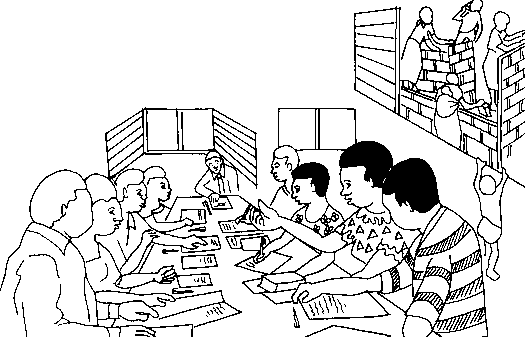Tweet
Translations:
Català
Deutsch
English
Español
Filipino/Tagalog
Français
Ελληνικά / Elliniká
हिन्दी / hindī
Italiano
Português
Română
Српски / Srpski
Türkçe
اردو / Urdu
Other formats:
Other Pages:
Modules
Site Map
Key Words
Contact
Utility Documents
Useful Links
Contents:
Contents:
Contents:
WRITING REPORTS FOR WHOM?
By Phil Bartle, PhD
A Guide for Community Mobilizers
PART B: Who Should Receive Reports?
Before deciding who should receive any report, it would be useful to review who benefits from those reports. Let us look at the benefits to each of these:
- These include:
- The authors of the report;
- The community engaged in the project;
- Any other community;
- Donors and contributors (including community members);
- Researchers; and
- Government: central, district, local.
Benefits to the Author(s):
At first glance, one might assume that the recipient benefits first and foremost from a report. Not quite! The first beneficiary is the author (or authors).
Why is that? In our workshop, I asked the mobilizers to suggest why the author or authors might benefit from writing a report. Here are some of their suggestions:
- It arranges and organizes the available information;
- Information just inside one's head is disorganized;
- Any missing information can be identified;
- The author can get a total and more neutral view;
- It makes analysis and assessment easier;
- It clarifies the relationship between the activities (input) and the (output) results;
- It assists the author in making a less biassed self assessment;
- It provides information for making recommendations; and
- It can lead to changes in objectives, strategies, and/or activities in the future.
A bonus benefit (possible, but not guaranteed) is feedback (advice, experience, recommendations, about the report, author, and others). After the authors, of course, the next beneficiaries are the recipients.
Who Receive Reports?
Consider the actors that should receive reports. (When writing reports, always remember who will read them). All can use reports for the same benefits as listed above.
These can include the CBO (community based organization or the executive of the community project), LC (Local Council), CAO (District's Chief Executive Officer), DPC (District Programme Coordinator), the agency or project national headquarters (which might in turn report to UN, the government, home headquarters, and the donors).
When objectives, strategies and activities are modified (based on reports) the project can be fine tuned and improved; then the target communities benefit from those reports.
Decisions by community based organizations, such as sending copies of financial statements (when and to whom), and verbal reporting at community meetings, are made in similar brainstorming sessions as the facilitator trainer guides community members through the why and how.
How Do Recipients Benefit?
How do recipients of reports benefit? There are three main ways they can benefit: information, assessment, encouragement.
Table 1: Who Benefits from Reports? |
|
| Who Benefits? | How Do they Benefit from Reports? |
|---|---|
| The author(s) of the report | Through writing, the author(s) learn skills (how to organize ideas, how to write), identify weaknesses, identify failures and successes, and identify strengths (many hidden until written). Writing (itself) improves assessment abilities. |
| The community engaged in the project | Just as "seeing" helps the driver of a car check on its speed and direction, so a community "sees" its progress through monitoring and reporting. Results (reaching desired objectives) make community members feel happy and encouraged (to do more) (especially verbal reports). |
| Any other community | By seeing or hearing about a community's progress, people in any other community get their awareness raised; they learn that such things are possible. When the read or hear about the community's achievements, they are also given courage (encouragement) to undertake their own community projects. |
| Researchers | Researchers can use well written reports as sources of research data. |
| Donors and contributors | Donors and contributors can learn how their donated money, labour, land, or donations in kind are being used, by reading or hearing reports. Remember that all the community members are donors. Do not think that only outsiders are donors. |
| Government: Central, District, and Local | Community project reports and mobilizers' reports help by providing vital information that is needed for informed and effective planning, at the central, district and local level of Governments. As in the other cases above, reports are also a source of encouragement, useful to Governments as well as others. |
This table indicates that many different actors benefit from well written reports, and so that when reports are written, they should be written with those readers in mind.
––»«––
Reporting Progress to the Community Executive:
 |